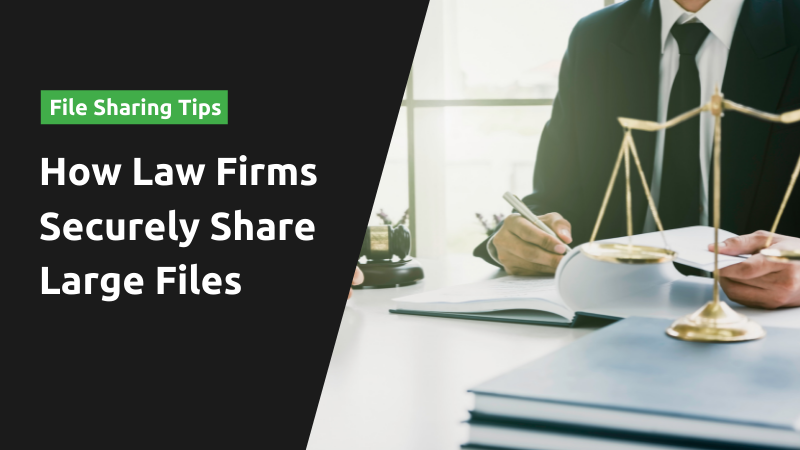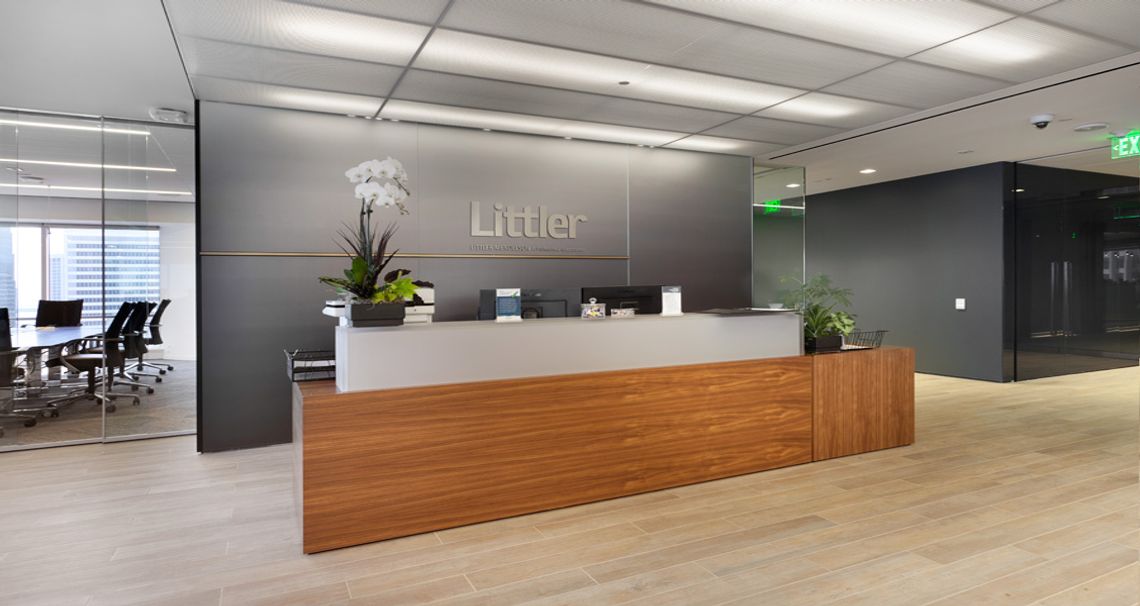Legal professionals share millions of documents and tons of confidential information every day. But are you sure that everyone on your team is doing these large file transfers securely while adhering to all compliance requirements? Security breaches and cyber attacks are becoming more and more prevalent; in this era, it is crucial to ensure that every file you share within or outside the department reaches the right person without being intercepted by any outside threats.
This guide will discuss the typical obstacles faced by law firms when transferring large files, assess the drawbacks of conventional file transfer techniques, and demonstrate how contemporary secure file sharing solutions, such as TitanFile, can enable legal professionals to transfer files easily, securely, and swiftly with encryption.
Why Secure Large File Transfers Are Critical for Law Firms?
Whether you are a part of a large firm or a solo practitioner, you must have faced the frustrations of facing a roadblock while trying to share voluminous case files, e-discovery documents, evidence or contracts.
Security and compliance are paramount when you are dealing with a massive amount of sensitive information. Failing to transfer files securely can lead to data breaches, regulatory penalties, and loss of client trust. At the same time, legal work is fast-paced, and attorneys need solutions that let them exchange files quickly and efficiently without jumping through IT hoops.
When seeking a secure solution for transferring large files for your law firm, it’s crucial to consider these factors:
Client Expectations and Agility: In an era of instant communication, clients expect their lawyers to send and receive large documents swiftly. Delays caused by clunky file-sharing methods can hinder case progress and client service.
Compliance Requirements: Law firms must comply with privacy laws and industry regulations. For example, firms in Canada need to ensure PIPEDA compliance when handling personal information, and firms dealing with health records must ensure HIPAA compliance. Using unsecured methods (or platforms with servers outside required jurisdictions) could violate these rules.
Cybersecurity Risks: Confidential legal documents are a gold mine for cybercriminals. Every transfer method used must protect data through encryption and robust security measures. Data leaks from an insecure transfer can result in severe consequences for both the firm and its clients.
Resource Constraints: In many firms, the IT team is small or stretched thin. Any file sharing solution should allow lawyers and support staff to handle transfers in a self-serve manner without constant IT assistance. This frees up IT resources and empowers legal teams to work more independently.
In short, modern law practices require a way to share large files securely – one that is easy for legal professionals to use, meets stringent security standards, and keeps the firm’s data protected and compliant.
Limitations of Traditional File Sharing Methods in Law Firms
In the past, law firms used different legacy tools to send large files. They relied on email attachments, FTP servers, USB flash drives, and even couriered CDs or drives. Unfortunately, these methods often prove unreliable or risky when it comes to secure file sharing for law firms. Let’s see why these traditional file sharing approaches fall short for today’s legal environment:
Email Attachments – Convenient but Limited and Unsecured
Emails are the most commonly used by lawyers in law firms to share documents and files across the team or with their clients. But standard email practice comes with a number of constraints when it comes to secure large file transfers.
Strict Size Limits: Most email providers impose attachment size caps (often ~20–25 MB per email). A single scanned litigation binder or a set of high-resolution evidence photos can easily exceed this limit. Dividing a single large file into multiple smaller emails is inefficient, appears unprofessional, and creates unnecessary clutter.
Lack of Security: Unless you implement additional security measures such as encryption or password protection, standard emails are a highly insecure method for sharing sensitive files. There is no guarantee that the recipient’s email is secure and that the shared attachments will not be forwarded or mistakenly handed over to unauthorized individuals. This is particularly concerning due to the significance of client confidentiality in legal fields.
No Confirmation or Tracking: With basic email, lawyers often have no idea if the recipient received or opened the file. Did it land in a spam folder? Was it too large to deliver? Lack of audit trails makes it impossible to monitor the proof of delivery and proof of access.
Because of these issues, email alone isn’t a reliable way to send large files securely in the legal industry. Experts note that popular services like Gmail or Outlook become unreliable for large and sensitive file transfers due to the size constraints and security gaps. Law firms require a more robust solution when file sizes grow beyond a few megabytes or when confidentiality is critical.
FTP – Powerful but Not User-Friendly or Fully Secure
File Transfer Protocol (FTP) has been used in law firms for decades to move large datasets, such as discovery files or extensive case archives. FTP servers can handle big files better than email, but they come with their drawbacks:
Complexity: FTP isn’t designed for the average user. Setting up an FTP transfer often requires technical knowledge. In law firms utilizing FTP, lawyers and support personnel are unable to start transfers independently; they depend on the IT department for assistance. This dependency not only creates delays and bottlenecks but also reduces work efficiency.
Security Concerns: Standard FTP is not encrypted, meaning data (including confidential client files) could potentially be intercepted in transit. Law firms handling sensitive information should only use secure FTP (SFTP), with added encryption. But not all firms have implemented SFTP, and an improperly configured FTP can jeopardize the integrity of the files. Even with SFTP, managing user permissions and passwords is critical to prevent unauthorized access.
Maintenance & Reliability: Running an FTP server requires maintenance and can incur costs. Connections might drop, requiring transfer restarts (though FTP/SFTP can resume transfers, this still complicates the process). For distributed teams or clients, setting up FTP accounts and credentials can be a hassle. Overall, it’s an IT-heavy solution in an age when more user-friendly, cloud-based options exist.
In summary, while FTP was a go-to solution for large file transfer in the past, its lack of user-friendliness and potential security pitfalls make it less ideal for law firms today, especially when easier, encrypted file transfer services are available.
USB Drives & Portable Media – No Size Limits, But High Risk
Some legal professionals still resort to copying large files to USB flash drives or external hard drives, especially when dealing with many gigabytes of data (e.g. evidence videos, large contract databases). Physically handing over or mailing a USB drive can bypass digital size limits. However, this method introduces serious security and logistical issues:
Loss and Theft: USB drives are small and easily lost or stolen. A misplaced drive containing confidential case files or personal client data is a nightmare scenario. There’s typically no encryption on the drive itself, so anyone who finds it could access the files.
Malware Spread: Plugging a USB drive into multiple computers not only transfers files, but it can also transfer viruses or malware. If any computer in the network is compromised, the malware can hitch a ride on the USB, infecting other systems and potentially corrupting or exposing files.
Lack of Audit Trail: When data is handed off on a drive, there’s no tracking of who accessed it or when. If a client claims they never received a document, you have little evidence to prove delivery. This lack of oversight can be problematic for compliance and accountability.
Inefficiency: Physically sending drives via courier or mail is slow compared to electronic transfer. It could take days for a mailed USB to arrive, versus seconds or minutes with a proper online solution. In legal proceedings, those delays could impact case timelines.
USBs might offer no file size limits in practice, but the security trade-offs are steep. As cybersecurity threats rise, relying on unencrypted physical media is increasingly seen as an unacceptable risk for law firms. Firms need a way to get the same “no limits” benefit without putting client data confidentiality at risk.
Other Workarounds – “Free” File Share Services and Others
In the absence of a firm-wide solution, lawyers and staff sometimes turn to free file-sharing services like cloud drives or personal Dropbox accounts to send large files. Though these workarounds seem easier than FTP or mailing a USB, they come with concerns:
Security & Compliance: Free cloud services may not meet law firm security standards. They might store data in jurisdictions that conflict with privacy laws, for example, Canadian firms using a U.S.-hosted service without a data residency guarantee, potentially impacting PIPEDA compliance. Encryption might not be end-to-end, and the provider could theoretically access the data.
File Size Limits in Free Services: Many free services still limit file sizes or total storage unless you pay for a premium. They might also impose bandwidth limits or delete files after a certain time. Large law firms dealing with huge volumes will likely exceed these limits within a few days.
Lack of Control: IT department has very limited to no control over the use of such unauthorized applications since they have no visibility or authority over shared content or its recipients. This can lead to security breaches or loss of confidential information without the firm even knowing. There’s also typically no formal support or legal agreement in place to protect the firm if something goes wrong.
In general, conventional techniques and makeshift solutions for transferring large files often fall short. They tend to lack adequate security, user-friendliness, or reliability to meet the needs of legal professionals. This paves the way for contemporary solutions crafted specifically to enable lawyers to send large files securely, eliminating the typical frustrations associated with such tasks.
Key Features to Look For in a Secure File Transfer Solution
Given the shortcomings of legacy tools, a question arises about what an ideal secure file sharing solution for law firms includes. When evaluating modern large file transfer tools, legal teams and IT specialists should look for the following features without fail:
End-to-End Encryption: All data should be encrypted in transit and at rest using strong algorithms like AES 256-bit so that only authorized parties can access the files. Even if data is intercepted or stored on a third-party server, it remains unreadable without the decryption keys. This level of encryption is considered industry-leading for secure large file transfers.
Robust Security & Compliance: Look for platforms that have been audited and certified for high security standards. Key benchmarks include SOC 2 Type II, ISO 27001 and industry-specific compliances like PIPEDA, HIPAA and GDPR. These certifications indicate the provider follows strict protocols to keep data safe. Also, features like two-factor authentication (2FA) and detailed audit logs add extra layers of protection and transparency.
No File Size Limits and Performance: The solution should allow secure large file transfers without size or volume restrictions. Whether you need to send a 50 GB folder of evidence videos or thousands of pages of scanned PDFs, the platform shouldn’t choke. Additionally, fast upload/download speeds and the ability to handle entire folders at once will save time. Modern solutions leverage cloud infrastructure to offer lightning-fast file transfers – e.g. TitanFile can upload files at speeds up to 500 Mbps, dramatically improving turnaround times.
Data Residency Options: For law firms, where your data is stored is a part of compliance. If you operate in Canada or the EU and need data to reside domestically, the service should offer data residency in those regions. Top secure file sharing platforms let you choose to store data in Canada, the US, Europe, Middle East or Australia. This flexibility helps satisfy requirements like keeping Canadian client data on Canadian soil for PIPEDA, or EU data within GDPR zones.
Ease of Use: Attorneys are not tech experts, and they don’t have time to go through a steep learning curve just to learn how to use the software. To drive quick adoption, the solution must be extremely user-friendly and intuitive. High ease-of-use translates to higher adoption across the firm and less frustration for clients as well.
Integrations with Your Existing Tech Stack: Most law firms prefer tools that seamlessly integrate with their current workplace systems so they can maintain familiar workflows. Look for a secure file sharing solution that works smoothly with your document management systems (DMS), SIEM platforms, and everyday software like Microsoft 365, Outlook, and other productivity tools. The right integration capabilities make adoption easier, reduce training needs, and ensure that secure file transfer fits naturally into your team’s daily operations.
Self-Service & Collaboration Features: The ideal platform enables secure client collaboration beyond just file transfer. This could include secure messaging or comment threads linked to files. It may also have shared project folders organized by client or case. Attorneys and support staff need to have self-serve access, enabling them to create their secure channels and send files to external parties without having to constantly involve IT. This empowers legal teams to work efficiently while maintaining security. A detailed audit trail reporting feature is essential to monitor all activities, including who accessed the file and when.
Reliability and Support: The legal profession operates around the clock, making it crucial to avoid any downtime, especially when important filing deadlines approach. Many leading solutions claim to offer high uptime and dedicated support teams. Law firms typically evaluate success based on criteria such as reliability, usage, and user feedback. Therefore, the solution you select should excel in these areas.
By evaluating solutions against this checklist, your firm can identify one that meets all the requirements and is an ideal fit for your work system. One platform that fulfills these criteria is TitanFile. They provide the best secure file-sharing solution available in the market, trusted by industry leaders.
Let’s explore how TitanFile can help your law firm stay secure and compliant with its simple and intuitive file-sharing solution.
TitanFile: Secure, Compliant Secure Large File Transfer for Law Firms
Many leading law firms have modernized their file sharing by adopting TitanFile, an award-winning secure file sharing and client collaboration platform built with legal professionals in mind.
TitanFile eliminates common large file transfer challenges with a solution that is secure, fast, and simple. Here’s why it’s recognized as one of the most trusted secure file sharing platforms in the legal industry:
Unlimited Secure Large File Transfer at Lightning-fast Speed: With TitanFile can send any file, type or volume without worrying about the file-size limits. The platform is optimized for performance, with upload speeds reported at up to 500 Mbps, far outpacing traditional methods. Large evidence videos, lengthy transcripts, or graphics-heavy presentations can be sent in just seconds, not hours. This means faster case preparation and no time wasted on slow uploads.
Enterprise-Grade Security & Encryption: Security is where TitanFile truly shines. All files shared through TitanFile are protected with AES 256-bit encryption, a level of security so strong it’s used by government agencies to protect their confidential data. Files are encrypted both in transit and at rest, ensuring that data remains secure from the moment you hit upload to the moment the recipient downloads it. It also offers multi-factor authentication and granular access controls to ensure the right people can view and download the shared files.
Data Residency & Compliance: TitanFile provides data residency options in the USA, Canada, Europe, Middle East, and Australia, allowing firms to choose their data storage locations in compliance with local privacy laws. It operates secure, certified data centers and offers on-premises or private cloud solutions. TitanFile is ISO 27001 and SOC 2 Type II certified, and complies with HIPAA, PIPEDA, and GDPR, ensuring enterprise-level compliance without manual management.
Ease of Use: Despite being loaded with all these security features, TitanFile is extremely easy to use. The interface is designed specifically for legal professionals and is as easy-to-use as email. This leads to high adoption by attorneys and clients alike. Users can drag-and-drop files into secure “channels” and send secure links or messages just like composing an email. There’s virtually no learning curve, and TitanFile’s intuitive design leads to more efficiency and less reliance on the IT support desk.
Smart Integrations for Seamless Workflow: TitanFile integrates with leading workplace tools and systems, including NetDocuments, DocuSign, Microsoft 365, Outlook, and SIEM platforms to strengthen your firm’s tech stack and fit naturally into your existing workflows. For example, with TitanFile’s Secure Send for Outlook, lawyers can send large files or entire folders directly from their email interface without worrying about attachment size limits, while ensuring every message is encrypted end-to-end. By keeping the process within tools lawyers already use, TitanFile makes secure file sharing incredibly convenient.
Self-Serve Feature & Collaboration: TitanFile allows legal teams to share information easily without relying heavily on IT. Attorneys and support staff can create secure channels, invite clients or co-counsel as collaborators, and start exchanging files immediately. The platform supports two-way collaboration, enabling clients or external parties to upload files securely and continue ongoing exchanges. With features like secure messaging, audit logs, and instant notifications, you can track when files are downloaded and discuss documents within a secure channel. This ensures a collaborative environment where all interactions are logged and time-stamped for future audits.
Real-World Impact: Littler Mendelson
When the world’s largest labor and employment law firm needed a secure way to move massive volumes of sensitive data, Littler Mendelson turned to TitanFile. In just one year, they securely transferred 46 terabytes of data across 10,000 workspaces, all without disrupting workflows.
“We only select technology that offers best-in-class information security, and this is the key reason why we chose TitanFile as our secure transfer platform.” — Paul Weiner, National eDiscovery Counsel, Littler Mendelson
With over 1,800 lawyers in 90 offices worldwide, Littler’s choice shows that TitanFile can handle large file transfer demands at the highest levels of legal practice securely, efficiently, and at scale.
Conclusion
Digital transformation in the legal industry demands tools that can keep up with the large file transfer needs of modern law practice while safeguarding confidentiality. Traditional methods like email, FTP, and USB drives may seem easy to use or convenient, but they often fall short of the security, speed, and user-friendliness demanded by today’s workplace.
With TianFile, law firms can get an enterprise-grade security, encrypted secure large file transfer that meets the compliance standards and a super easy user experience that lawyers and clients can enjoy. If your firm is still struggling with email attachment errors, clunky FTP processes, or insecure workarounds, this is the right time to consider a change.
Ready to modernize your firm’s file sharing practice? Try TitanFile for free today and experience how it makes your life easy. Don’t let outdated methods hold your firm back – easy and secure large file transfer is just a click away.
Secure Large File Transfer FAQs for Law Firms
What’s the most secure way for law firms to share large files?
Use a secure file-sharing platform that provides end-to-end encryption, complies with all regulatory standards, and enforces strict access controls, such as TitanFile.
What integrations should law firms look for while selecting a file transfer tool?
Integrations with document management systems, e-signature tools, and workplace software like Microsoft 365 and Outlook help maintain smooth workflows.
Where should law firms store sensitive data?
Select a service that offers data residency options and encrypts data in transit and at rest to meet privacy laws.
Can large files like e-discovery data or video evidence be sent securely?
Yes, choose a secure large file transfer solution that supports all sizes and types of files while offering fast upload and download speeds.






